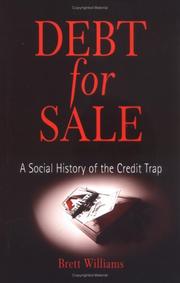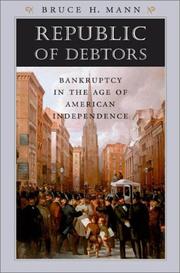| Listing 1 - 10 of 76 | << page >> |
Sort by
|
Book
ISBN: 0300253737 0300251890 Year: 2020 Publisher: New Haven, CT : Yale University Press,
Abstract | Keywords | Export | Availability | Bookmark
 Loading...
Loading...Choose an application
- Reference Manager
- EndNote
- RefWorks (Direct export to RefWorks)
Why have so many middle-class Americans encountered so much financial trouble? In this classic analysis of hard-pressed families, the authors discover that financial stability for many middle-class Americans is all too fragile. The authors consider the changing cultural and economic factors that threaten financial security and what they imply for the future vitality of the middle class. A new preface examines the persistent and new threats that have emerged since the original publication. “[A] fascinating, alarming study. . . . [This] chilling diagnosis of middle-class affliction demonstrates that we all may be only a job loss, medical problem or credit card indulgence away from the downward spiral leading to bankruptcy.”—Publishers Weekly "A well-designed and carefully executed study."—Andrew Greeley, University of Chicago "The Fragile Middle Class, a well-written work of social science that is about as gripping as the genre gets, forces us to reevaluate notions about consumerism."—American Prospect
Bankruptcy --- Consumer credit --- Finance, Personal --- Consumer debt --- Credit
Book
ISBN: 0585131457 Year: 1999 Publisher: [Place of publication not identified] Nolo
Abstract | Keywords | Export | Availability | Bookmark
 Loading...
Loading...Choose an application
- Reference Manager
- EndNote
- RefWorks (Direct export to RefWorks)
Consumer credit --- Finance, Personal --- Credit ratings --- Consumer debt --- Credit
Book
ISBN: 8024623196 8024622874 9788024623191 9788024622873 9788024623191 Year: 2013 Publisher: Prague [Czech Republic]
Abstract | Keywords | Export | Availability | Bookmark
 Loading...
Loading...Choose an application
- Reference Manager
- EndNote
- RefWorks (Direct export to RefWorks)
Loans --- Consumer credit --- Consumer debt --- Borrowing --- Lending --- Loans for consumption --- Credit --- Finance --- Investments
Book
ISBN: 282183702X 211129375X Year: 2014 Publisher: Paris : Institut de la gestion publique et du développement économique,
Abstract | Keywords | Export | Availability | Bookmark
 Loading...
Loading...Choose an application
- Reference Manager
- EndNote
- RefWorks (Direct export to RefWorks)
Au lendemain de la Seconde Guerre mondiale, le crédit à la consommation a mauvaise réputation. Accordé à des taux souvent élevés, il apparaît surtout contraire à la politique du crédit désormais nationalisé. Les priorités vont au financement de la production et non à la satisfaction des besoins des ménages. Toutefois, en 1953, la Reconstruction s’achève. L’objectif de l’industrie française n’est plus seulement de produire mais de vendre. Or, le pouvoir d’achat des Français reste faible. Soucieux d’accroître leurs débouchés, les industriels se mobilisent pour créer des organismes de crédit en partenariat avec de grandes banques. Le ministère des Affaires économiques les suit pour faire de ce crédit un moyen de relancer la croissance. Encore s’agit-il d’en assainir la distribution. Car, face aux besoins et à l’absence de réglementation, le « crédit noir », usuraire, prospère. C’est précisément à la construction du marché du crédit à la consommation dans les années 1950 et 1960 que ce livre est consacré. Pourquoi la constitution de grands établissements financiers a-t-elle été favorisée ? Comment les nouveaux prêteurs, Sofinco créé en 1951 et Cetelem en 1953, ont-ils évalué les risques du crédit aux particuliers ? La réglementation a-t-elle permis de lutter contre l’usure ? En revenant sur les origines du crédit à la consommation en France, cet ouvrage permet de mieux comprendre les enjeux de l’accès au crédit qui, à l’époque, soulevaient déjà des questions d’une étonnante actualité
Consumer credit --- Government policy --- Consumer debt --- Credit --- economic and financial history

ISBN: 0812218868 9786613211255 1283211254 0812200780 Year: 2011 Publisher: Philadelphia : University of Pennsylvania Press,
Abstract | Keywords | Export | Availability | Bookmark
 Loading...
Loading...Choose an application
- Reference Manager
- EndNote
- RefWorks (Direct export to RefWorks)
Credit and debt appear to be natural, permanent facets of Americans' lives, but a debt-based economy and debt-financed lifestyles are actually recent inventions. In 1951 Diners Club issued a plastic card that enabled patrons to pay for their meals at select New York City restaurants at the end of each month. Soon other "charge cards" (as they were then known) offered the convenience for travelers throughout the United States to pay for hotels, food, and entertainment on credit. In the 1970's the advent of computers and the deregulation of banking created an explosion in credit card use-and consumer debt. With gigantic national banks and computer systems that allowed variable interest rates, consumer screening, mass mailings, and methods to discipline slow payers with penalties and fees, middle-class Americans experienced a sea change in their lives. Given the enormous profits from issuing credit, banks and chain stores used aggressive marketing to reach Americans experiencing such crises as divorce or unemployment, to help them make ends meet or to persuade them that they could live beyond their means. After banks exhausted the profits from this group of people, they moved into the market for college credit cards and student loans and then into predatory lending (through check-cashing stores and pawnshops) to the poor. In 2003, Americans owed nearly
Consumer credit --- Debt --- Consumer debt --- Credit --- Anthropology. --- Business. --- Economics. --- Folklore. --- Linguistics. --- Political Science. --- Public Policy.

ISBN: 0674009029 0674032411 0674040546 9780674040540 0674265785 Year: 2022 Publisher: Cambridge, MA
Abstract | Keywords | Export | Availability | Bookmark
 Loading...
Loading...Choose an application
- Reference Manager
- EndNote
- RefWorks (Direct export to RefWorks)
Debt was an inescapable fact of life in early America. By 1800, imprisonment for debt was under attack and insolvency was no longer seen as a moral failure, merely an economic setback. In this text, the author illuminates this transformation in early American society.
Debt --- Consumer credit --- Bankruptcy --- Dettes --- Crédit à la consommation --- Faillite --- Crédit à la consommation --- E-books --- Consumer debt --- Credit

ISBN: 0262026015 9780262026017 0262524953 9786612097409 1282097407 026226837X 1429477210 9780262268370 9781429477215 Year: 2006 Publisher: Cambridge, Mass. MIT Press
Abstract | Keywords | Export | Availability | Bookmark
 Loading...
Loading...Choose an application
- Reference Manager
- EndNote
- RefWorks (Direct export to RefWorks)
Academic research and policy discussions of credit markets usually focus on borrowing by firms and producers rather than by households, which are typically analyzed in terms of their savings and portfolio choices. The Economics of Consumer Credit brings together leading international researchers to focus specifically on consumer debt, presenting current empirical and theoretical research crucial to ongoing policy debates on such topics as privacy rules, the regulation of contractual responsibilities, financial stability, and overindebtedness.The rapidly developing consumer credit industry in the United States is mirrored by that in Europe, and this volume is noteworthy for its cross-national perspective. Several chapters compare the use of credit markets by households in different countries, while others focus on single country case studies--including consumer credit dynamics in Italy, the role of housing expenditure in the cyclical pattern of borrowing in the United Kingdom, and the use of credit cards by U.S. consumers--to illustrate general insights. Other chapters draw policy lessons from the U.S. experience with bankruptcy regulation and the development of the credit counseling industry. Finally, the book reviews historical, theoretical, and empirical aspects of information sharing, of particular interest in light of the integration of European Union credit markets.ContributorsCarol C. Bertaut, Giuseppe Bertola, Sarah Bridges, Luca Casolaro, Jonathan Crook, Richard Disney, Leonardo Gambacorta, Charles Grant, Luigi Guiso, Michael Haliassos, Andrew Henley, Robert M. Hunt, Tullio Jappelli, Nicola Jentzsch, Marco Pagano, Amparo San Jose Riestra, Michael Staten, Michelle J. White
Consumer credit --- Consumer credit. --- Finance --- Business & Economics --- Credit, Debt & Loans --- 332.743 --- Consumer debt --- Credit --- ECONOMICS/Microeconomics --- ECONOMICS/Finance
Book
ISBN: 3631512376 Year: 2003 Publisher: Frankfurt am Main Lang
Abstract | Keywords | Export | Availability | Bookmark
 Loading...
Loading...Choose an application
- Reference Manager
- EndNote
- RefWorks (Direct export to RefWorks)
351.82*7 --- Consumentenrecht --- Consumer credit --- Consumer protection --- Law and legislation --- 351.82*7 Consumentenrecht --- Consumer debt --- Credit

ISBN: 0262279827 0585448418 9780262279826 9780585448411 0262134225 Year: 2003 Publisher: Cambridge, Mass. MIT Press
Abstract | Keywords | Export | Availability | Bookmark
 Loading...
Loading...Choose an application
- Reference Manager
- EndNote
- RefWorks (Direct export to RefWorks)
"Credit reporting is a critical part of the financial system in most developed economies but is often weak or absent in developing countries. It addresses a fundamental problem of credit markets: asymmetric information between borrowers and lenders that can lead to adverse selection and moral hazard. The heart of a credit report is the record it provides of an individual's or a firm's payment history, which enables lenders to evaluate credit risk more accurately and lower loan processing time and costs. Credit reports also strengthen borrower discipline, since nonpayment with one institution results in sanctions with others." "This book provides the first comprehensive review of credit reporting systems worldwide and documents the rapid growth in the industry. It offers empirical and theoretical evidence of the impact of credit reporting on financial markets, using examples from both developed and developing economies. Credit reporting, it shows, significantly contributes to predicting default risk of potential borrowers, which promotes increased lending activity. The book also covers the role of public policy in the development of credit reporting initiatives, including the role of public credit registries managed by central banks; and the role of legal, regulatory, and institutional factors in supporting credit reporting."--Jacket.
Credit bureaus --- Consumer credit --- Credit --- Credit information services --- Credit reporting agencies --- Mercantile agencies --- Consumer debt --- Information services
Book
ISBN: 9782711022700 2711022706 Year: 2015 Publisher: Paris : LexisNexis,
Abstract | Keywords | Export | Availability | Bookmark
 Loading...
Loading...Choose an application
- Reference Manager
- EndNote
- RefWorks (Direct export to RefWorks)
Crédit --- Contrats --- Prêts bancaires --- Crédit à la consommation --- Etablissements de crédit --- Prêts commerciaux --- Droit --- Banking law --- Commercial law --- Consumer credit --- Consumer debt --- Credit --- Établissements de crédit --- Prêts commerciaux.
| Listing 1 - 10 of 76 | << page >> |
Sort by
|

 Search
Search Feedback
Feedback About UniCat
About UniCat  Help
Help News
News